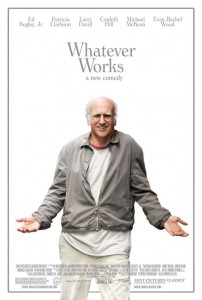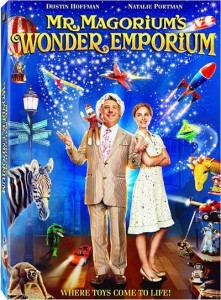Whatever Works
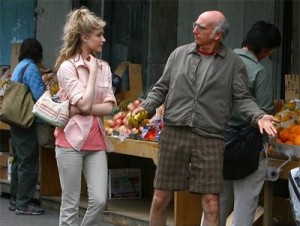 Is it possible for a movie to be stagey and dated even if it was neither based on a play nor more than a few weeks old? Are cranky Jews all the same or is there a significant difference based on where they grew up and the specific cause of their self-hatred? Do all recent Woody Allen movies have to be shot in brown-vision?
Is it possible for a movie to be stagey and dated even if it was neither based on a play nor more than a few weeks old? Are cranky Jews all the same or is there a significant difference based on where they grew up and the specific cause of their self-hatred? Do all recent Woody Allen movies have to be shot in brown-vision?
Whatever Works, Woody Allen’s annual venture into making forgettable comedies that one or more critics are likely to deem “Woody’s best movie in years!” (What does that even mean? The last Allen movie that would be worthy of being “best since” is 20 years old, 1989’s Crimes and Misdemeanors), takes the daring premise of an misanthrope who talks to the audience, lives in an expansive loft in the middle of New York City, and literally finds a naïve 19-year-old former beauty pageant contestant on his doorstep whom he unintentionally charms into falling in love with him. For Allen, this is clearly not a stretch, not because of his real-life conquest of his adopted daughter [and now-wife] Soon-Yi Previn, but because the story of Whatever Works more closely resembles his relationship with the 17 year-old Mariel Hemingway in 1979’s Manhattan (which would make sense seeing as the Whatever Works script was apparently written right after Annie Hall in 1977).
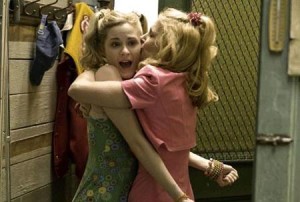 Just like with Manhattan, the romantic interest in Whatever Works, this time played by Evan Rachel Wood, is tall, blond, pale-skinned, long legged, and innocent as compared to the dour, baldish, spectacled, condescending version of Woody Allen, played by Larry David in this incarnation. David is the closest visual representation that has played Allen in one of his films, and despite the socially awkward, patronizing style of David’s comedy in Seinfeld and Curb Your Enthusiasm, he and Allen only have surface-level things in common. David’s material relies on being mean-spirited and nasty, often with complicated plot turns to ratchet up the discomfort, while Allen’s films are heavy on dialogue, light on story (his plot-heavy Match Point is so confused, it doesn’t really qualify as the “funniest movie Allen had made in years!”) and he pretends he’s kidding with the constant put-downs.
Just like with Manhattan, the romantic interest in Whatever Works, this time played by Evan Rachel Wood, is tall, blond, pale-skinned, long legged, and innocent as compared to the dour, baldish, spectacled, condescending version of Woody Allen, played by Larry David in this incarnation. David is the closest visual representation that has played Allen in one of his films, and despite the socially awkward, patronizing style of David’s comedy in Seinfeld and Curb Your Enthusiasm, he and Allen only have surface-level things in common. David’s material relies on being mean-spirited and nasty, often with complicated plot turns to ratchet up the discomfort, while Allen’s films are heavy on dialogue, light on story (his plot-heavy Match Point is so confused, it doesn’t really qualify as the “funniest movie Allen had made in years!”) and he pretends he’s kidding with the constant put-downs.
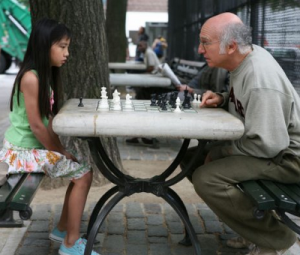 This stylistic issue would come to the forefront no matter which nebbish Allen went with, even Albert Brooks (though the fidgety, stammering, disinterested Hugh Grant might eventually be a good choice), and Larry David, perhaps perplexed as to what he should be doing, and just makes us aware that he’s “on” in every scene, instead of feeling out the part. He doesn’t relax and become himself until the last 20 minutes, by which point we’ve become quite tired of him looking down on people and calling them “inchworms.” That’s actually boring after the first minute, but it continues throughout the movie, which would be fine if the rest of the movie were funny, but aside from one half-clever line (“I don’t want normal, healthy men, I want you”), there’s just a bunch of dumb jokes about rednecks and obvious set-ups about beauty queens evolving into Asian prostitutes. The fact that the apartment set seems so stagebound, there’s almost no pretense of pretending we’re not on a set in every single scene, makes the movie quite hollow and canned. The rhythm of everything resembles a thrown-together 1950s sitcom shot in front of an audience, with the actors constantly acknowledging them. The message of the film, that if needed, love can be forced, is probably unintentional. Most of the material could be chalked up to scene Allen cut out of the original 3 hour version of Annie Hall, but the stuff that wasn’t good enough to be reused in Manhattan.
This stylistic issue would come to the forefront no matter which nebbish Allen went with, even Albert Brooks (though the fidgety, stammering, disinterested Hugh Grant might eventually be a good choice), and Larry David, perhaps perplexed as to what he should be doing, and just makes us aware that he’s “on” in every scene, instead of feeling out the part. He doesn’t relax and become himself until the last 20 minutes, by which point we’ve become quite tired of him looking down on people and calling them “inchworms.” That’s actually boring after the first minute, but it continues throughout the movie, which would be fine if the rest of the movie were funny, but aside from one half-clever line (“I don’t want normal, healthy men, I want you”), there’s just a bunch of dumb jokes about rednecks and obvious set-ups about beauty queens evolving into Asian prostitutes. The fact that the apartment set seems so stagebound, there’s almost no pretense of pretending we’re not on a set in every single scene, makes the movie quite hollow and canned. The rhythm of everything resembles a thrown-together 1950s sitcom shot in front of an audience, with the actors constantly acknowledging them. The message of the film, that if needed, love can be forced, is probably unintentional. Most of the material could be chalked up to scene Allen cut out of the original 3 hour version of Annie Hall, but the stuff that wasn’t good enough to be reused in Manhattan.
It is clear that Allen was in Annie Hall mode anyway, that movie’s original title was Anhedonia (the inability to enjoy anything), which would be a nearly perfect title for Whatever Works. With regard to Allen’s recent films, I might be catching a case of it too.
—————————————————————————————–
Whatever Works has one of my favorite clichéd images on its poster, with the lead actor smirking and grimacing at the same time, with his hands bent at the wrists, palms out, as if to say “what I am gonna do?” The other suggestion is when this is used in a sitcom and the gesture is supposed to mean “isn’t everything so wacky/wonderful?” See the poster for Mr. Magorioum’s Wonder Emporium for one of the best examples.
